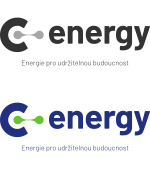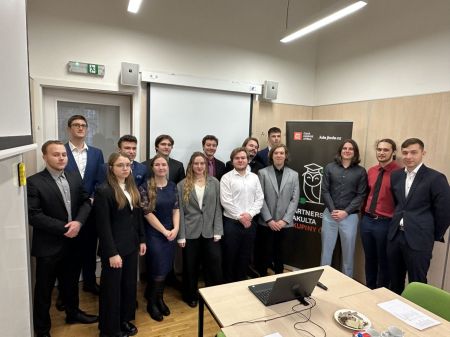 SVK 2025
SVK 2025Ve čtvrtek 20. 11. 2025 proběhla Studentská vědecká konference pro bakalářské a magisterské studenty. Soutěže se zúčastnilo celkem 17 studentů ve dvou sekcích (Energetika a Energetika - koroze).
Vítězné příčky:
sekce Energetika
- Bc. Alexander Kollmann
- Bc. Ondřej Michal
- Bc. Vojtěch Fiala
sekce Energetika - koroze
- Bc. Viachaslau Radzeuski
- Šimon Vančata
- Bc. Jakub Bernad
Gratulujeme.
Všem účastníkům děkujeme a přejeme jim úspěchy v dalším studiu.
Poděkování patří také sponzorům sekce: ČEZ, a.s., C-Energy s.r.o. a HST Hydrosystémy s.r.o.
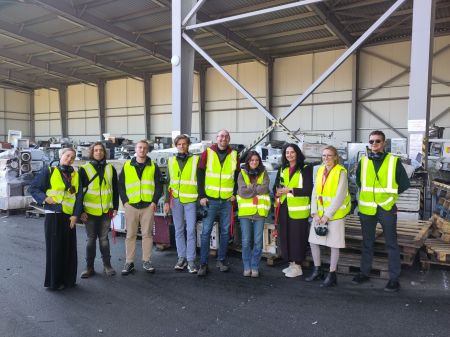 Exkurze do třídící linky a spalovny nemocničního odpadu
Exkurze do třídící linky a spalovny nemocničního odpaduNa konci října uspořádal Ústav energetiky v rámci vyučovaného předmětu Energetické využití odpadu exkurzi s návštěvou třídící linky a spalovny nemocničního odpadu.
Třídící linka provozovaná společností Rumpold se specializuje na zpracování chladících zařízení včetně lednic, mrazáků nebo klimatizací. Studenti měli možnost nahlédnout do technologií provozu od odběru a skladování materiálu až po jeho zpracování na výstupní produkty.
Druhou navštívenou technologií byla spalovna nemocničního odpadu provozovaná v rámci Fakultní nemocnice Hradec Králové. Zde byli účastníci exkurze seznámeni s provozem spalovny počínaje vstupem nemocničního odpadu jakožto paliva, přes jeho spalování až po jednotlivé stupně čištění spalin a nakládání se vznikajícími residui ze spalování odpadu.
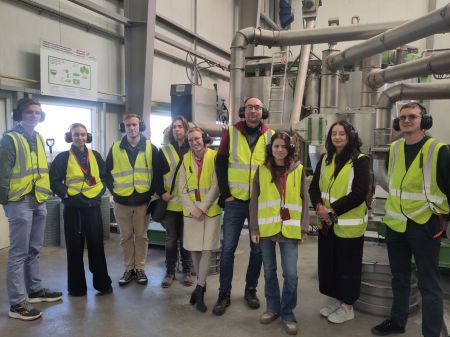
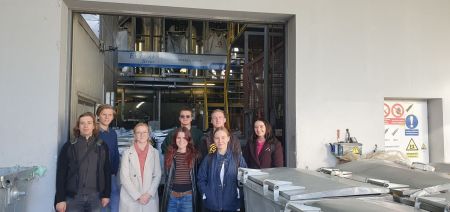
Excursion to a waste sorting line and hospital waste incinerator
At the end of October, the Department of Power Engineering organized a trip as part of the Waste Energy Utilization course, which included a visit to a waste sorting line and a hospital waste incinerator.
The sorting line visited, which is operated by Rumpold company, specializes in the processing of cooling equipment, including refrigerators, freezers, and air conditioners. Students had the opportunity to see the technology used in the operation, from the collection and storage of materials to their processing into end products.
The second technology visited was a hospital waste incinerator operated by the Faculty Hospital in Hradec Králové. Participants were introduced to the operation of the incinerator, starting with the input of fuel in the form of hospital waste, through its incineration, to the individual stages of flue gas cleaning and the storage of residues from waste incineration.
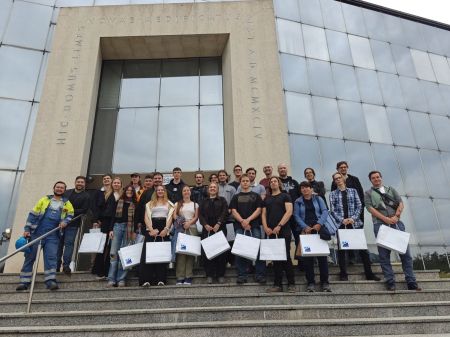 Exkurze studentů magisterského programu Energie a paliva
Exkurze studentů magisterského programu Energie a palivaZářijová exkurze Ústavu energetiky a Ústavu udržitelných paliv a zelené chemie
Ve dnech 10.–12. září 2025 se studenti magisterských specializací Chemické technologie v energetice, Technologie ropy a alternativních paliv a Plynná a pevná paliva zúčastnili tradiční odborné exkurze Ústavu energetiky a Ústavu udržitelných paliv a zelené chemie.
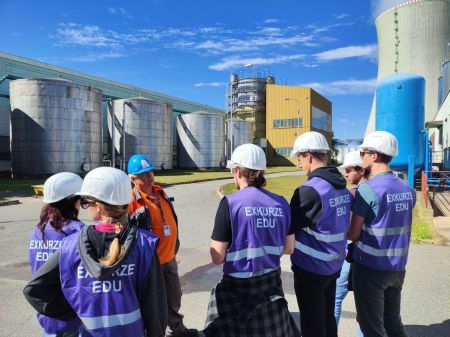
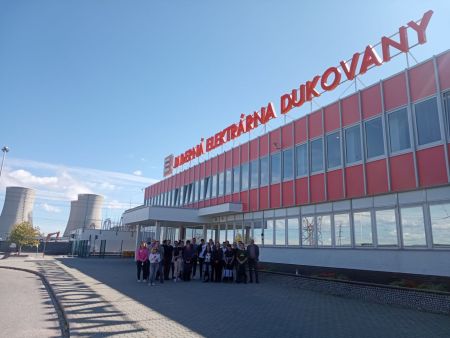
Během tří dnů navštívili mimo jiné předávací stanici zemního plynu NET4GAS v Lanžhotu, Jadernou elektrárnu Dukovany, biomethanovou stanici BSP Rakvice a Elektrárnu Hodonín, která dnes spaluje převážně biomasu. Závěr exkurze patřil Muzeu naftového dobývání a geologie v Hodoníně, kde se studenti seznámili s historií těžby ropy a plynu v Česku.
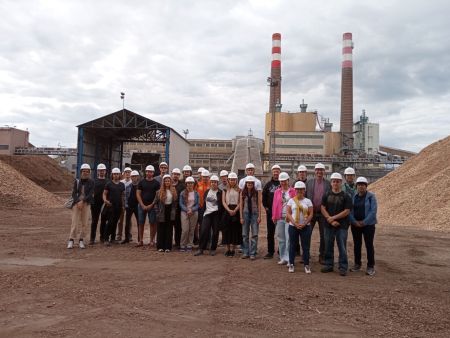
September excursion of the Department of Power Engineering and the Department of Sustainable Fuels and Green Chemistry
At the beginning of September, from September 10 to September 12, 2025, first- and second-year master's students from both departments together with teachers went on an excursion to South Moravia.
During these three days, participants visited key energy facilities including the NET4GAS natural gas transfer station in Lanžhot, the Dukovany Nuclear Power Plant, the BSP Rakvice biomethane plant, and the Hodonín Power Plant, which today operates mainly on biomass. The excursion concluded with a visit to the Museum of Oil Mining and Geology in Hodonín, offering insight into the history of oil and gas production in the Czech Republic.
The professional program was complemented by a pleasant evening atmosphere and a tasting of local wines typical of the South Moravian region.
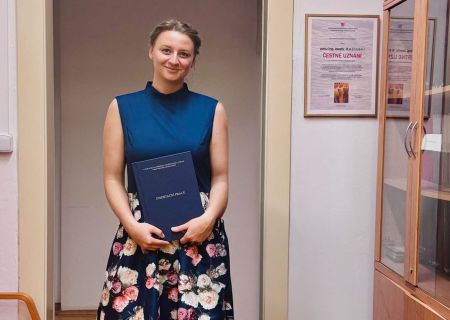 Obhajoba dizertační práce
Obhajoba dizertační práceIng. Lenka Matoušková obhájila svou dizertační práci na téma "Dekontaminace znečištěných vod v oblasti energetiky"
Gratulujeme!
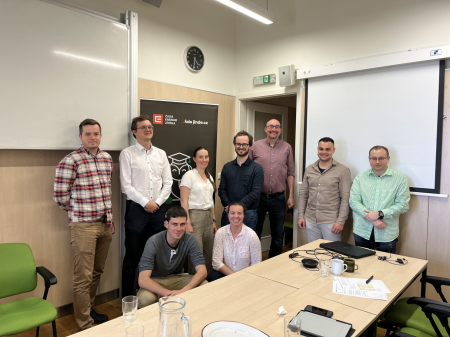 Doktorandský seminář
Doktorandský seminář
V úterý 20. května se na Ústavu energetiky konal již tradiční doktorandský seminář, jehož cílem bylo představit a diskutovat výzkumná témata studentů doktorského studia. Setkání proběhlo za účasti seniorních výzkumníků z našeho ústavu a obohatila jej i návštěva vedení Ústavu fyziky plazmatu Akademie věd ČR.
Během dne se rozproudily živé diskuze nejen o odborných aspektech jednotlivých projektů, ale i o studijních a vědeckých (ne)úspěších, které k vědecké práci neodmyslitelně patří. Celá akce se nesla v přátelské a otevřené atmosféře, která umožnila sdílení zkušeností i navázání nových kontaktů.
Seminář opět ukázal, jak důležitá je mezioborová vědecká komunikace – nejen pro rozvoj jednotlivých projektů, ale i pro celkový posun výzkumu vpřed.
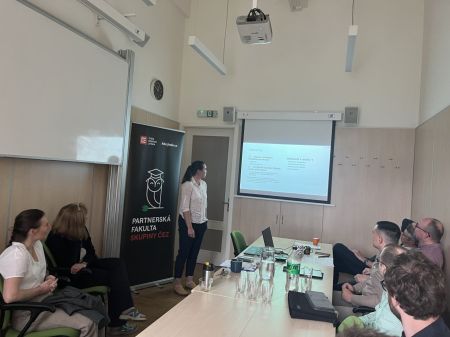
⸻
PhD Seminar at the Department of Energy Once Again Highlighted the Importance of Interdisciplinary Discussion
On Tuesday, May 20th, the Department of Power Engineering hosted its traditional PhD seminar, aimed at presenting and discussing the research topics of doctoral students. The event took place with the participation of senior researchers from our department and was enriched by the visit from the Institute of Plasma Physics of the Czech Academy of Sciences.
Lively discussions unfolded throughout the day, covering not only the scientific aspects of individual projects but also the academic and research (mis)adventures that are an inherent part of the PhD journey. The seminar was held in a friendly and open atmosphere that encouraged experience sharing and the building of new connections.
Once again, the seminar demonstrated how vital interdisciplinary scientific communication is—not only for the development of individual projects but also for advancing research as a whole.
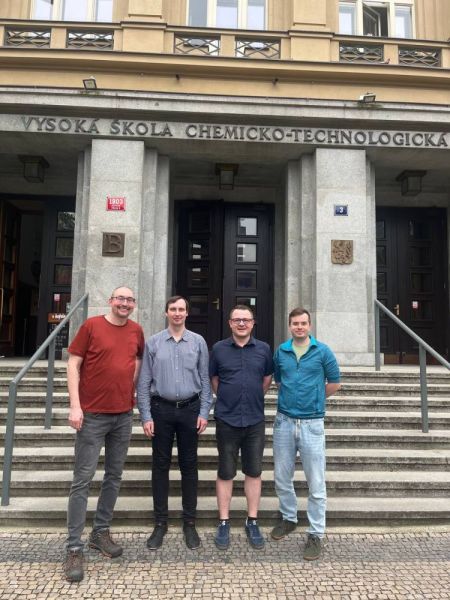 Zahraniční stáž doc. Andrii Koveria z Ukrajiny na našem ústavu
Zahraniční stáž doc. Andrii Koveria z Ukrajiny na našem ústavuV období od 24. března do 17. dubna 2025 působil na našem ústavu doc. Andrii Koveria, Ph.D. z Dnipro University of Technology (Ukrajina) v rámci vědecké stáže financované Mezinárodním visegrádským fondem.
Během svého pobytu se věnoval výzkumu termochemické interakce mezi biomasou a uhlím, s cílem posoudit možnosti částečné náhrady uhlí biomasou při výrobě koksu. Zvláštní důraz kladl na analýzu prvkového složení vstupních směsí (biomasa–uhlí) a výstupních koksů. Pro tyto účely využíval přístroj TGA a odbornou podporu našich specialistů.
Výsledkem této spolupráce je příprava vědecké publikace v odborném časopise a rozvoj spolupráce se členy našeho ústavu na několika mezinárodních výzkumných projektech.
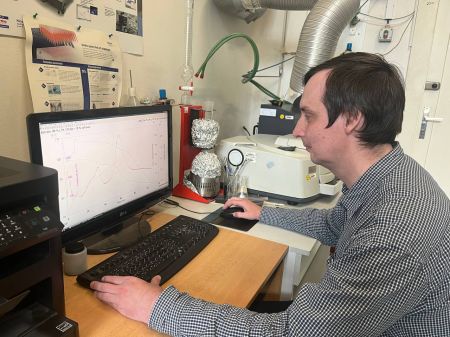
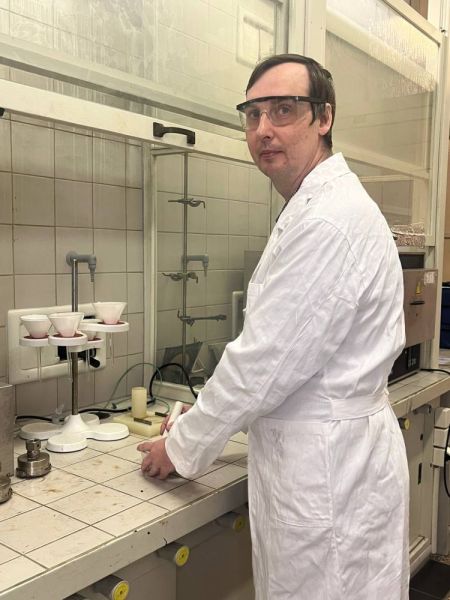
Between March 24 and April 17, 2025, our department hosted Assoc. Prof. Andrii Koveria Ph.D., from Dnipro University of Technology (Ukraine), as part of a research fellowship supported by the International Visegrad Fund.
During his stay, Assoc. Prof. Koveria focused on studying the thermochemical interaction between biomass and coal, aiming to explore the potential for partially replacing coal with biomass in coke production. Particular attention was given to analyzing the elemental composition of both the input biomass–coal mixtures and the resulting coke samples. For this research, he made extensive use of TGA instrumentation, supported by the expertise of our staff.
The collaboration has resulted in the preparation of a scientific article for publication in a research journal and the development of follow-up cooperation with members of our department on several international research projects.
 Malé modulární reaktory- příležitost pro ČR
Malé modulární reaktory- příležitost pro ČRSMR jako jedna z cest k energetické soběstačnosti ČR a k nízkoemisní energetice
dne 16.4. od 14 h, posluchárna B33
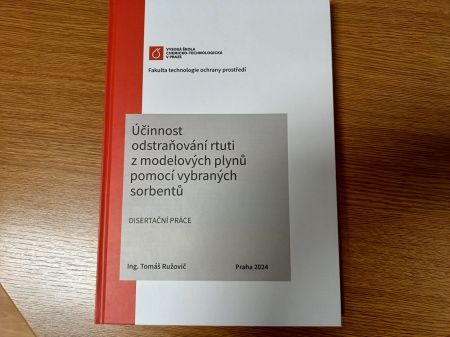 Obhajoba dizertační práce
Obhajoba dizertační práceVe středu 11. 12. 2024 úspěšně obhájil Ing. Tomáš Ružovič svou disertační práci “Účinnost odstraňování rtuti z modelových plynů pomocí vybraných sorbentů“, pod vedením doc. Ing. Michaela Pohořelého. Disertační práce se zaměřuje na chemické vlastnosti sloučenin rtuti, jejich výskyt v prostředí, metody analýzy a možnosti dekontaminace spalin pomocí různých sorbentů. Gratulujeme přejeme mnoho dalších akademických úspěchů.
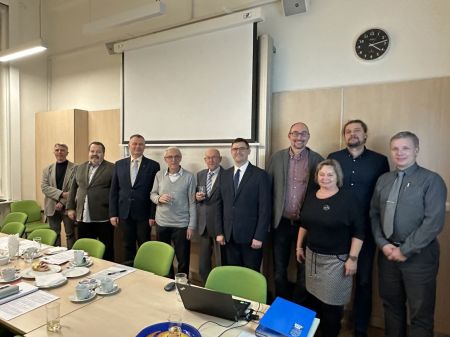
On Wednesday 11 December 2024, Ing. Tomáš Ružovič succsefully defended his dissertation thesis "Efficiency of mercury removal from model gases using selected sorbents", under the supervision of assoc. professor Michael Pohořelý. The dissertation focuses on the chemical properties of mercury compounds, their occurrence in the environment, methods of analysis and the possibility of decontamination of flue gases using various sorbents. Congratulations and best wishes for many more academic successes.
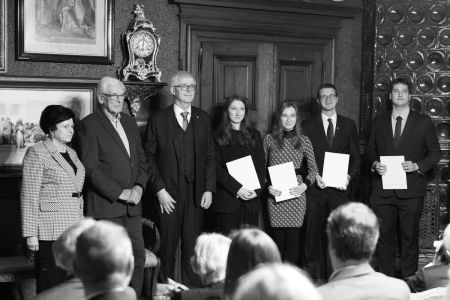 Hlávkova nadace ocenila Kryštofa FrankaGratulujeme!
Hlávkova nadace ocenila Kryštofa FrankaGratulujeme!Přednáška Ing. Dufka, který je absolventem VŠCHT, byla zaměřena na budoucnost v oblasti jaderné energetiky a malé modulární reaktory. V druhé části přednášky Ing. Šimák představil možnosti spolupráce pro studenty všech úrovní studia v rámci skupiny ČEZ, a.s. jako jsou například letní školy, online přednášky odborníků z praxe a další.
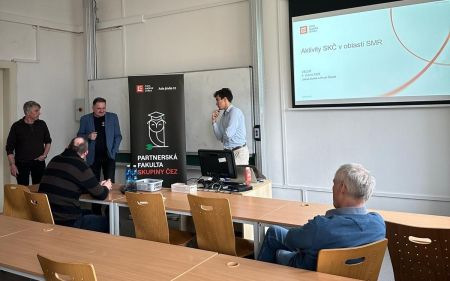
On April 4, 2024 at VŠCHT there was held a lecture by representatives from ČEZ, a.s. Ing. Jakub Dufek and Ing. Pavel Šimák. The lecture was focused on the future of nuclear energy in the Czech Republic and plans of ČEZ in this area. Furthermore, the students were offered opportunities for cooperation within the summer school, expert lectures or SMR camp.
Náš student Ing. Jaromír Valtr se účastnil mezinárodní jaderné školy v Jáchymově, která proběhla 18. až 22. března 2024. Letošním tématem byla výstavba nových jaderných bloků v Česku a Evropě. Kromě přednášek expertů z českých a slovenských univerzit a společností zde přednášeli i experti z francouzské EDF, která je uchazečem v tendru na dostavbu JE Dukovany a Temelín. Výměna mezinárodních zkušeností byla podpořena i účastí mladých studentů z Francie.
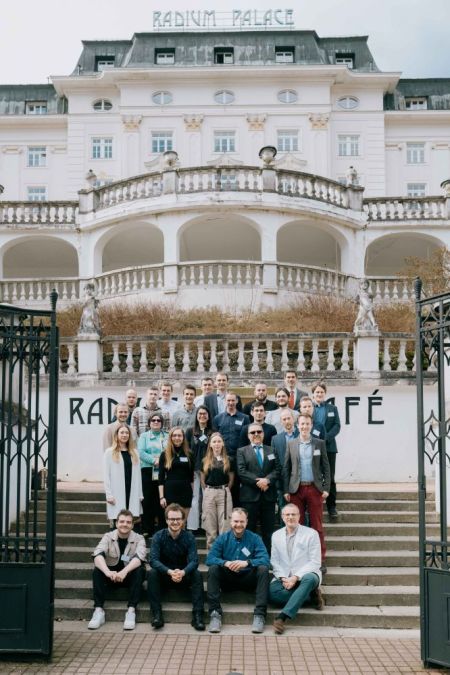
Our student Jaromír Valtr participated in the French-Czech-Slovak Trilateral Nuclear Winter School focused on “Nuclear New Build” which took place from 18th to 22nd March 2024 in Jáchymov, Czech Republic. The school aimed to provide students with a broad understanding of nuclear power plant construction, emphasizing not only technological solutions but also topics like siting, licensing, and safety. Twenty international students attended lectures by 13 experts (including those from French EDF company), collaborated on group projects, and showcased their work by week's end.
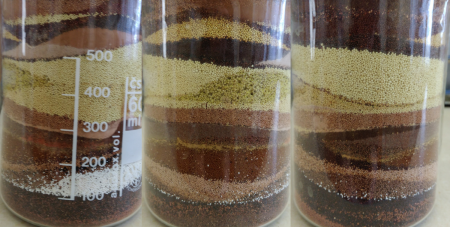 ionexy všech barev......... když uklízíte stůl po odevzdání dizertační práce
ionexy všech barev......... když uklízíte stůl po odevzdání dizertační práce KACHEKRAN 2018energetici na Kachekranu
KACHEKRAN 2018energetici na Kachekranu












